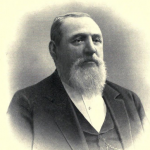
Among the prominent influential citizens of Idaho, Colonel Dewey, of Dewey, enjoys a unique position and reputation. He is a pioneer Idahoan in the true sense of that word, and the marvelous development of the interests and industries of his adopted state is largely attributable to his enterprise and sagacity. He is a man of remarkable resources, and has never failed to measure fully up to all the requirements and emergencies of life. Although over seventy years old, he is well preserved and exhibits unabated vigor of mind and body. Colonel Dewey is a native of the state of New York, and his first American ancestors were early settlers in Massachusetts.
In the autumn of 1863 he came to Idaho and located where the town of Dewey now is, but subsequently removed to where the town of Ruby City was located, and with others, March 21, 1864, laid out the town of Silver City.
The gentleman whose name introduces this review is a born miner, and from his first arrival in Idaho the Colonel became prominently connected with the mining interests of the northwest, in which connection it is perfectly fair to say that he has been one of the leading and principal factors in the development of the mineral resources of this state. He owned nearly half of the South Mountain camp during the period of its greatest activity and was one of three men to discover and locate this magnificent property.
He purchased the Trade Dollar mine in 1889, and after making numerous and expensive improvements upon it, sold to the present owners one hundred and thirty-four thousand of the five hundred thousand shares.
He also owns over one-half of the Florida Mountain group of mines and has just succeeded in forming a combination of these mining properties, in which he holds the strategic position. The accomplishment of this consolidation required rare tact and finesse.
At the village of Dewey, a town named in his honor, the Colonel has erected one of the best twenty-stamp mills in Idaho, or even in the west. He has also erected the fine Dewey Hotel, which is considered one of the best in the state, and he has built a beautiful residence for himself, and in addition constructed numerous valuable residences and business houses in the town of Dewey. He is also the projector and owner of the Boise, Nampa & Owyhee Railway, on which line is a splendid steel bridge, crossing the Snake River at Guffey, which is the pride of the whole state. Colonel Dewey built this bridge at his own expense, and also the railroad from Nampa to Guffey, which he is now extending to Murphy. He is also preparing to extend his road north from Nampa, the surveys now having been completed for a distance of fifty miles. When all these extensions are completed, the road will connect with the Central Pacific and furnish a continuous line from San Francisco to Butte, Montana, and thereby shorten the distance between these two points by about three hundred miles.
Colonel Dewey is distinctly a man of great practical turn of mind. He is simple in his habits and unassuming in his manners, being all energy, push and enterprise. He was cast in a large mold and would have been conspicuous and successful in any department of human activity that he might have entered. He has been frequently urged to accept nominations for import-ant official positions, but has invariably declined. His name is now mentioned in connection with the nomination for United States senator from Idaho. This is against the Colonel’s wishes, but his many friends are very urgent in their requests that he shall openly enter the field for that distinguished office.
